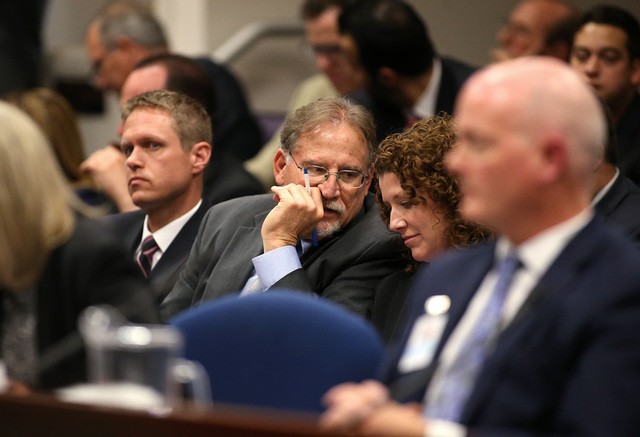
CARSON CITY — Nevada lawmakers grilled administration officials Monday about Gov. Brian Sandoval’s “Plan B” tax proposal, with most queries focused on how a new commerce tax will be implemented and enforced.
But representatives of the state’s largest industries, including resorts, banking, mining, utilities and hospitals, told members of the Assembly Ways and Means and Senate Finance committees that they support the governor’s plan, estimated to raise $262 million annually.
“We think it’s very important that we begin to broaden the tax base,” said Billy Vassiliadis, representing the powerful Nevada Resort Association, long a supporter of expanding Nevada’s tax structure.
Conservative members on the legislative money committees voiced the most objections to administration officials’ arguments that establishing a tax based on gross receipts for large companies would be complicated.
“It sounds more like a tax attorney’s dream,” said Assemblywoman Jill Dickman, R-Sparks.
Not all industries were supportive. Paul Enos, with the Nevada Trucking Association, said the commerce tax rate imposed on his industry would hurt low-margin enterprises.
“I’m not up here to say no,” Enos said. “We will pay more taxes … but we want a mechanism that works.”
Randi Thompson, state director of the National Federation of Independent Business, also opposed the commerce tax, adding that most of the members would support expanding the modified payroll tax.
Others, such as the petroleum industry, also complained about costs and industry volatility.
Some criticism drew the ire of Assemblywoman Marilyn Kirkpatrick, D-North Las Vegas.
“We’ve studied the crap out of taxes,” Kirkpatrick said. “You know what we’ve done with it? Nothing.”
She scolded the business community.
“You have all said let’s fix the tax structure. Here we are with the same story, just a different year,” Kirkpatrick said.
The commerce tax would apply to companies with $3.5 million or more in annual gross revenue. Proposed tax rates range from 0.051 percent to 0.331 percent, depending on industry type.
Critics of the plan argue the varying rates based on businesses category will pit industries against each other every legislative session.
“We are going to be in a scrum every single session,” Enos said.
Mike Willden, Sandoval’s chief of staff, said it would apply to about 10,000 business, most of which are out-of-state companies that conduct business in Nevada but escape paying taxes.
Sandoval’s measure contains three elements — increasing business license fees, raising the rate on the payroll tax, and instituting the gross receipts commerce tax.
Companies subject to the commerce tax portion would be able to deduct half of that tax obligation against any modified business taxes owed. The MBT is assessed on payroll.
Sandoval’s measure also provides that if the commerce and MBT taxes generated come in at 104 percent of projections, the MBT rate can be reduced.
No action was taken by the committees, but legislators face a deadline of midnight June 1 to fund Sandoval’s roughly $7.3 billion budget or face a special session.
The governor’s new proposal, called the “Nevada Revenue Plan,” was introduced late in the session after his initial idea to tie business license fees to gross receipts passed the Senate but sputtered and collapsed in the Assembly.
The proposal was introduced as an amendment to Assembly Bill 464, an alternative plan drafted by Republican Assembly Majority Leader Paul Anderson, R-Las Vegas; Assemblyman Derek Armstrong, R-Henderson; and Speaker John Hambrick, R-Las Vegas.
Some witnesses in the hours-long hearing Monday said they could support the original version of AB464 without the governor’s commerce tax.